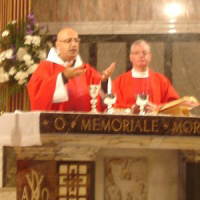Middle East peace depends on Christian presence

Fr Nassif at Paisley Cathedral Mass
Only a strong Christian presence in the Middle East can restore peace in the region, according to a priest from Lebanon speaking in Scotland. This was the message Maronite Fr Samer Nassif gave to the more than 180 people who gathered in the hall of St Mirin's Cathedral, Paisley on the evening of Thursday 20 September.
His message was echoed by Liz Leydon, editor of the Scottish Catholic Observer, and Aid to the Church in Need's national director, Neville Kyrke-Smith, who were also speaking at the event organised by Catholic charity.
Speaking about Pope Benedict XVI's visit to Lebanon earlier this month, Fr Nassif, said: "Our Pope confirmed that without Christians there is no possibility of coexistence, peace and forgiveness between different non-Christian religious communities."
He used Iraq as a case study, saying: "Since at least 20,000 Christian families fled Baghdadin 2004. The civil war between Muslims - Sunnis and Shiites - exploded to such an extent that US forces, to stop the killings, had to build walls. Even today walls continue to divide Baghdad."
He quoted Iraqi Prime Minister Nouri al-Maliki, who said: "Without the return of Christians to Baghdad, this Arab capital would be forever divided by walls. Discussing the current crisis inSyria, Fr Nassif said: "There is no possibility of reconciliation and peace between the Alawites and Sunnis in Syria, without Christians."
Stressing persecution and emigration have been at the root of the decline of Christians in the region over the last 50 years, he said: "From Morocco to Pakistan, with the notable exception of Lebanon and Armenia, the Christians of the Middle East undergo discrimination in terms of justice and civic rights."
Fr Nassif gave the example of Saudi Arabia's two million Christians who are forbidden for to gather for religious services, possess a Bible or wear a Crucifix.
Mr Kyrke-Smith's address reflected Fr Nassif's theme, stressing that Christians were essential to building bridges between people of different faiths in the region, and Ms Leydon talked about what the Pope's visit to Lebanon meant to Christians in Scotland.
Fr Nassif stressed that Christians were called to work for reconciliation between different religious traditions in the Middle East. He said: "The Pope asks the suffering Orient Church to become the Light of Christ to our neighbours, the Jews of Israel, as to the vast Muslim world that surrounds us by hundreds, hundreds and hundreds of millions."
Prior to the talk Fr Nassif was chief celebrant at Mass in Paisley Cathedral. Fr David Boyd, the new Administrator for Paisley Diocese, concelebrated.
Lorraine McMahon, Aid to the Church in Need's Head of Operations in Scotland said: "One highlight was the students of St Andrew's Academy singing 'One Candle' - it gave us goosebumps and Fr Samer described it as memorable and very touching."
Pupils from St Andrew's, and St Roch's Secondary School, Glasgow took part in the service. They proclaimed the readings and bidding prayers, brought up the gifts at the offertory and, with the Knights of St Columba, carried out stewarding.
Ms McMahon said: "In attendance were fellow Lebanese from the local Paisley community who contributed well to the evening adding their input to life and traditions in their native country." She added: "Having spoken to benefactors and attendees on the night, the highlight of the evening was Fr Samer reciting the Our Father in Aramaic" - the language probably spoken by Jesus - "it was spellbinding. Benefactors said 'It was like having Jesus right here with us'."


















